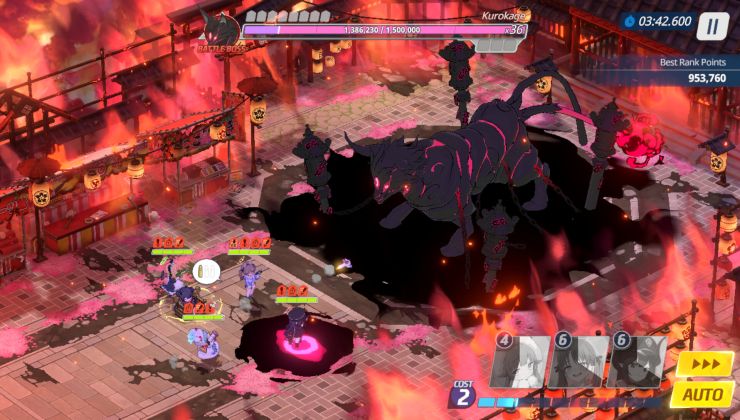The Invisible Hand is a first-person stockbroker experience where you try and get rich quick, while you work for the trading firm FERIOS. Your only job is to make money and as much as possible.
Just like the real thing you will buy when they're going up, sell before you make a big loss and make as much commission as possible. Of course, it's not that simple. This is, after all, a game. You can find ways to make things easier, like lobbying an influential group to affect the market or even drive down an entire currency to boost your margins. It's a cut-throat world out there.

Direct Link
Developed by Power Struggle Games, a French game development collective "cheekily intent on dismantling Capitalism from the inside", through games and they say they're "unabashedly political".
On Steam, the developer mentioned a Linux build has now been provided and they're looking for feedback on it.
Check it out on Steam.
Developed by Power Struggle Games, a French game development collective cheekily intent on dismantling Capitalism from the inside, through games and they say they're "unabashedly political".If I buy their game, aren't I supporting capitalism? If they take my money, aren't they supporting capitalism? What's with all the hate for capitalism? It's the way for small studios like this to make something of themselves. Maybe they really mean corporate manipulation and greed which is something else entirely.
Sorry, it's the first thing that popped into my head.
1) Live below your means
2) Save
3) Invest in a total world index ETF (such as Vanguard)
4) Keep saving
That is about it, other than understanding your taxes.
https://www.amazon.com/Simple-Path-Wealth-financial-independence/dp/1533667926
Most financial mistakes come when you try to force things to happen faster than is required.
-- Morgan Housel
Quoting: RatmanYour comment is more or less analogous to people who say you're not allowed to worry about climate change unless your lifestyle has already been arranged to emit zero carbon. Capitalism is the system we live in, yes. Much as the folks involved in the Peasants' Revolt complained about feudalism even though they made their livelihood in it, people nowadays can complain about capitalism.Developed by Power Struggle Games, a French game development collective cheekily intent on dismantling Capitalism from the inside, through games and they say they're "unabashedly political".If I buy their game, aren't I supporting capitalism? If they take my money, aren't they supporting capitalism? What's with all the hate for capitalism? It's the way for small studios like this to make something of themselves. Maybe they really mean corporate manipulation and greed which is something else entirely.
And of course people told the Peasants' Revolt folks "There Is No Alternative". And chopped their heads off. But it turns out there are alternatives to feudalism.
Quoting: Purple Library GuyCapitalism is the system we live inNo it isn't.
One of the fundamentals of what is called Capitalism was sound money a.k.a. gold/gold standard. That stopped in 1916 and never came back.
Capitalism went from aprox. mid XVIII century to WWI and it was wonderful. It unleashed so much wealth creation as Humanity never dreamed of. We're still benefiting today. Just.
Quoting: RatmanThere is economy beyond capitalism. Buying goods, or selling them, does not necessarily mean you support capitalism. One could argue that video games are per se capitalist, or any other form of entertainment, but again depending what the studio does with their money, and how it's shared, might not fall into the term capitalism.Developed by Power Struggle Games, a French game development collective cheekily intent on dismantling Capitalism from the inside, through games and they say they're "unabashedly political".If I buy their game, aren't I supporting capitalism? If they take my money, aren't they supporting capitalism? What's with all the hate for capitalism? It's the way for small studios like this to make something of themselves. Maybe they really mean corporate manipulation and greed which is something else entirely.
Quoting: The_Aquabatthe problem is not capitalism the problem is crony capitalism, corrupt politicians that sale their asses to lobbyst, speculation, financial bubbles, hedge funds, etc.-There hasn't been a communist regime that has not turn into a dictatorship and exploitation of their citizens. As well as there has not been a capitalist regime that has not turned "crony". Hedge funds, speculation, financial bubbles, etc are incentivated by capitalism. So yeah, the problem is capitalism. Corruption is an endemic problem of any sort of unequal society.
My theory is that corruption is based in status and class differentiation, and bureaucracy too, where one offers money/power to someone based on the fact that a) the offerer has more money/power than the other party and b) the other party desires to reach a new status or maintain the status quo. But I might as well be wrong.
Quoting: DorritNo it isn't.Neo-liberalism is just another evolution of capitalism. Same practices, same flaws. And capitalism did not start in XVIII it goes back to the Italian republics and their wealthy banks before Europeans travelled to America. Which, by the way, they were mainly funded by families/banks in Geneva.
One of the fundamentals of what is called Capitalism was sound money a.k.a. gold/gold standard. That stopped in 1916 and never came back.
Capitalism went from aprox. mid XVIII century to WWI and it was wonderful. It unleashed so much wealth creation as Humanity never dreamed of. We're still benefiting today. Just.
Quoting: DorritIt unleashed so much wealth creation as Humanity never dreamed of. We're still benefiting today. Just.This deserves a quote separately. To what cost? Hundreds of species to the brink of extinction, the air we breath is diriter than ever, climate threatening to do a mass extinction, inequality and wealth concentration are worst than ever.
Stop praising a system that is going to end up killing everything in the planet. Stop thinking that capitalism is a force of nature that can't be taken account of, changed or improved.
Last edited by Arehandoro on 9 May 2021 at 4:23 pm UTC
Quoting: ArehandoroNeo-liberalism is just another evolution of capitalismNo, it's a perversion made possible by fiat money.
Quoting: ArehandoroAnd capitalism did not start in XVIII it goes back to the Italian republics and their wealthy banksYou're wrong, but this is not the place to deepen the conversation.
Quoting: TheSHEEEPI came here to see a bunch of "capitalism bad! Harrumph!" comments and was not disappointed.Capitalism bad! Harrumph! :grin:
But I think you're being a touch unfair. It's the game designers themselves who said "Capitalism bad". The first comment was a "capitalism good! Harrumph!"
And I personally haven't even said anything about capitalism yet, I've just pointed out that it's silly to rule out of bounds all critique of any system on the basis that the person criticizing is in, and part of, the system.
Quoting: Purple Library GuyLol you made me think of this inverse meme that could use a Capitolism version becoming a Banana RepublicQuoting: TheSHEEEPI came here to see a bunch of "capitalism bad! Harrumph!" comments and was not disappointed.Capitalism bad! Harrumph! :grin:
But I think you're being a touch unfair. It's the game designers themselves who said "Capitalism bad". The first comment was a "capitalism good! Harrumph!"
And I personally haven't even said anything about capitalism yet, I've just pointed out that it's silly to rule out of bounds all critique of any system on the basis that the person criticizing is in, and part of, the system.

Of course it points out my favorite point that neither Capitolism nor Communism as systems exist -- remember Tiananmen Square Masacre? That was the gov using rural folk against City College kids who were like "Yo bro, this isn't Communism, this isn't what we were promised".
On the other hand in the quote "Capitalist" world (lol), you have a handful of corporations literally control everything including government regulations.
Quoting: no_information_hereI already know how to win:Pretty much. If you're up to your eyeballs in dept and one paycheck away from bankruptcy, then you've already lost.
1) Live below your means
2) Save
3) Invest in a total world index ETF (such as Vanguard)
4) Keep saving
That is about it, other than understanding your taxes.
https://www.amazon.com/Simple-Path-Wealth-financial-independence/dp/1533667926
Most financial mistakes come when you try to force things to happen faster than is required.
-- Morgan Housel
First, capitalism is not markets. Up until (dates debatable) there was no capitalism, but there were markets since Babylonian times. Not only that, but some theorists of socialism envision factories and stores owned by the workers, the state, or the community, but still buying and selling their goods in markets (others don't). Capitalism is not even banks. Also note that no system is pure--to this day there are hunter-gatherers, there are agrarian peasants and so on, in all modern states there are elements of socialism, and in most countries of any size there are a few worker-owned co-ops in the mix of firms.
But the basic thing about capitalism is this: Ownership of what Marx called "the means of production" by private individuals, who hire workers for wages. These owners gained their ownership by having and investing capital. They sell what the workers produce, whether it be shoes or a computer game or financial advice, and hope to make a profit. This profit increases their capital; they can then reinvest it in order to get still more returns. So:
--Private wealth, invested in "means of production" (factories, machinery, offices, computers) becomes "capital"
--Workers, who don't own these things, are hired for wages, ideally less wages than what the stuff they make sells for
--Profit, return on investment, increases capital, allowing more investment
That's what capitalism is. It's called "capitalism" because it involves "capital", which involves private ownership of the means of production while labour does not own it. We've had a good deal of it ever since the industrial revolution and we have not stopped since. If you want to argue that there is (something good) that we had once upon a time but no longer have, well perhaps, but that (something good) is not capitalism, it's some specific variant of capitalism and you should find a proper word for it because capitalism as such is still very much with us. (Incidentally, as a side note, you can see that some things that don't even involve markets could still be capitalism, such as US military procurement)
Feudalism was different in two ways.
1) It was mostly about land ownership, nobles owning, peasants paying the nobles taxes/rent, mostly "in kind".
2) Production was done by individual craftspeople who owned their own tools; blacksmiths owned their smithy and hammers and such, cobblers owned their awls and whatnot. They might have apprentices working for them, but not for wages as such--the expectation was the apprentices would eventually get to become independent craftsmen themselves; they worked for room and board, training, and eventually sponsorship. This was not very growth-oriented and did not allow a great deal of division of labour, but the craftspeople were independent and relatively prosperous, certainly compared to non-union factory workers. It took a lot of coercion to get them stuffed into capitalist-owned factories.
Italian Renaissance merchants and bankers were not generally capitalists. They didn't own the means of production, they were middlemen. Quite important in their own way, but a different thing. Venetian merchants didn't even own their own ships--the merchant fleets of Renaissance Venice were built and owned by the government.
Last edited by Purple Library Guy on 9 May 2021 at 5:18 pm UTC
Quoting: Purple Library GuyBut the basic thing about capitalism is this: Ownership of what Marx called "the means of production" by private individualsThat's the Marxist interpretation and the origin of many a misconception.
What we today call Capitalism was not a system but a handful of circumstances together at the right time. It's not an idea, it just happened. And it started to go wrong when two of its main pillars were taken: first sound money (gold) followed by small government.
What should we call today's fiat money and leviathan governments? Don't know but Capitalism it ain't.
Quoting: DorritAh, no. That's well, wrong from start to finish.Quoting: Purple Library GuyBut the basic thing about capitalism is this: Ownership of what Marx called "the means of production" by private individualsThat's the Marxist interpretation and the origin of many a misconception.
What we today call Capitalism was not a system but a handful of circumstances together at the right time. It's not an idea, it just happened. And it started to go wrong when two of its main pillars were taken: first sound money (gold) followed by small government.
What should we call today's fiat money and leviathan governments? Don't know but Capitalism it ain't.
So, first: Marx was operating well within the Classical economic tradition, at least on the stuff I was talking about. Ricardo and all those guys would totally agree as to the nature of capital. Where they disagreed was on whether wage employment resulting in profits represented exploitation; they said it was free and open contracting between workers and capitalists so it's all good, he said in reality it was no such thing, it was a choice between taking the employer's offer and starvation, and considered the difference between wages and the value of what is produced to be exploitation.
Second, capitalism didn't really "just happen". The beginnings of it sort of did, but to get it to be the main part of the economy took a lot of concerted state action. For instance, to get a lot of the peasants to move to the city and work for wages, took a bunch of laws taking away their land, and a bunch more laws making it illegal to forage in forests ("poaching"), and a bunch more laws making it illegal to just kind of hang around ("vagrancy"), and the invention of police to make those laws stick. Much of this was very conscious--the workshop owners in the process of expanding those workshops into factories needed workers, and a lot of this stuff was quite specifically done to take away people's livelihoods and give them no option but to come and work. Also consider that the flagship of early British capitalism, the East India Company, was a state creation. Also consider that the raw materials that fed the British industry came from slave-operated plantations on Caribbean land, acquired from the people who previously lived there by the state.
This leads into the question of small government. The worship of small government is a relatively recent ideology. Adam Smith certainly wasn't into small government. And capitalism has always depended on the actions of government. Government defines the property regime capitalists require to even be considered to "own" the stuff they make profits from. It takes stuff away from people who aren't in the club, it makes sure nobody can take stuff from people who are in the club. It creates and regulates marketplaces, creates and enforces things like patents and copyrights, creates the infrastructures required for much production or transportation of goods, defines money. I would argue that the rise of the centralized state was one of the main contributing factors to capitalism being able to exist.
Fiat money. There have probably been times and ways in which the gold standard would have stopped some kinds of economic damage that happened. But basically, fiat money mostly works better. Through most of modern history, a serious adherence to the gold standard would have meant deflation, because the population and the economy were expanding, or trying to expand, faster than the supply of gold, which only gets bigger as fast as you can find some and mine it. Deflation causes depressions. What would have had to happen is a gold standard with repeated, near constant devaluation of the currency with respect to gold--which is to say, a de facto fiat currency but much clumsier and less flexible. Or they would have had to bypass it in other ways, like banks conveniently ignoring the level of their gold reserves when issuing loans. But in any case, the form of the currency is just not fundamental to the structure of the economy. It's a bit bigger than a detail, but it's certainly not important enough to be a factor in what economic system you want to say you're in. That idea just ignores how economies work and what drives them.
Finally, capitalist economies work best when governments are fairly large and work to mitigate inequality--in terms of quality of lives, but even economic growth. The data on that is clear. Unfortunately, such situations are unstable and tend not to last. The problem is that capitalists in a capitalist economy want all the goodies--it's their job to want all the goodies--and have a great deal of political power. They don't want fairly large, redistributive governments, so they work hard to make them go away. In democracies, part of that work involves persuading the electorate to believe in the fairy tale of wonderful small government. The amount of money they have spent on think tanks, public relations, media ownership, university chairs in economics and so forth to propagandize this idea is staggering. As a rule, people who believe in such things have been suckered by this operation. It's understandable, there's been a lot of money, effort and talent devoted to spreading it.
Quoting: Purple Library GuyAh, no...I've read your post attentively and I must say I rarely saw such a distorted view of History and basic concepts :sad:
Too bad we can't sit and have a long argument over a bottle of Scotch.
Last edited by Dorrit on 9 May 2021 at 8:05 pm UTC
Quoting: DorritIt would help a lot if you could at least say why his view is distorted. It won't be the same as sitting to have the argument, but it might help the conversation.Quoting: Purple Library GuyAh, no...I've read your post attentively and I must say I rarely saw such a distorted view of History and basic concepts :sad:
Too bad we can't sat and have a long argument over a bottle of Scotch.










 How to setup OpenMW for modern Morrowind on Linux / SteamOS and Steam Deck
How to setup OpenMW for modern Morrowind on Linux / SteamOS and Steam Deck How to install Hollow Knight: Silksong mods on Linux, SteamOS and Steam Deck
How to install Hollow Knight: Silksong mods on Linux, SteamOS and Steam Deck